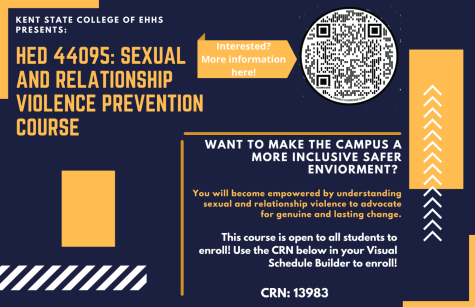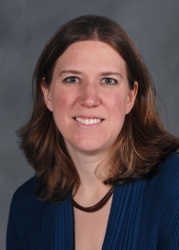Kent State launches new sexual and relationship violence prevention course
April 12, 2022

A course covering sexual and relationship violence prevention will be open to all students in the fall, after its successful pilot launch this semester.
The course instructor, Bayadir Alrehaili, is a graduate assistant at the Center for Sexual and Relationship Violence Support Services. The purpose of the course is to encourage students to speak out against sexual violence on campus.
“It provides the student with the knowledge and the skills needed to influence their peers and take responsibility to work around campus,” Alrehaili said.
“Sexual and Relationship Violence Prevention Course: Creating a Safer Campus” focuses on three main categories: prevention, awareness and activism.
The class meets once a week in the Williamson House for an hour of lecture followed by a 40-minute open discussion or activity. Alrehaili purposely designed the course this way to encourage students to share their stories, but not force conversations.
Some students do not share often, but Alrehaili said she can still tell she is having an impact.
“I see it in their eyes, like ‘Oh my God, this is happening to me,’” she said.

Even if a student is not in a relationship, the skills taught in class are still beneficial, she said. Some topics covered include self-care, safety planning and sexual citizenship, otherwise known as respecting boundaries and the right to say “no.”
“The most important thing is that I don’t want the students to feel stressed or overwhelmed when they take this course,” Alrehaili said. “It’s just to understand yourself.”
Students enrolled in the course participate in three workshops, write a reflection paper, engage in a book discussion and complete a final project. There are no quizzes or tests.
After a student completes the two-credit prevention course, they can apply to enroll in the one-credit practical course.
In this second course, students will advocate for sexual and relationship prevention on campus by becoming leaders of Students Team for Organizing Peers. STOP’s goal is to launch campaigns and share resources on campus in order to prevent relationship violence and sexual assault.
“I really see these students as leaders around the campus community helping to get the word out, to talk with their peers, to engage with the community in a way we haven’t been able to before,” said Jennifer O’Connell, the director of SRVSS.
STOP is important because it puts the reins in the students’ hands, O’Connell said.

“The message is coming from the students to the students versus from SRVSS or other institutional offices,” O’Connell said.
Any student can volunteer and participate in STOP. However, students who complete the practical course will be workshop leaders and educators.
“They can lead the conversation. They can lead the activities,” Alrehaili said. “When they do tabling or launching campaigns, students who successfully complete the course will be in a leadership position.”
Jenna Bal is a reporter. Contact her at [email protected].
























